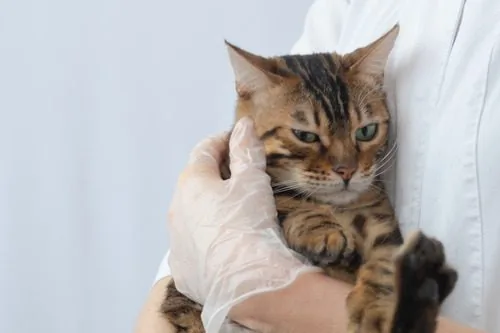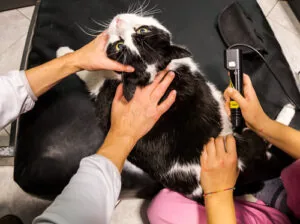Common Signs of Stress in Cats

Understanding and addressing stress in cats is essential for their well-being. As a pet owner, recognizing the signs of stress can help you provide the necessary care and support. At Dyer Animal Clinic in Dyer, Indiana, we are here to help you identify and manage stress in your feline companion. Call us at (219) 865-3737 for further assistance.
What Causes Stress in Cats?
Cats, like humans, can experience stress due to various factors. Changes in their environment, the introduction of new pets or people, loud noises, and even changes in their daily routine can trigger stress. Understanding the root causes can help you better manage your cat’s stress levels.
Common Behavioral Signs of Stress
Behavioral changes are often the first indicators that your cat is stressed. Recognizing these signs can help you take the necessary steps to alleviate their anxiety.
Increased Aggression or Irritability
One of the most noticeable signs of stress in cats is a change in their behavior, particularly increased aggression or irritability. If your normally gentle cat suddenly becomes aggressive, hisses, or swats at you or other pets, it might be a response to stress. This behavior often stems from fear or anxiety about a perceived threat.
Excessive Grooming
Cats are known for their grooming habits, but excessive grooming can be a sign of stress. When stressed, some cats may groom themselves so frequently that they develop bald spots or skin irritations. This behavior is often a coping mechanism to deal with anxiety.
Changes in Appetite
Stress can significantly impact a cat’s eating habits. Some cats may lose their appetite and refuse to eat, while others might overeat as a form of comfort. Both scenarios can lead to health issues, so it’s crucial to monitor any sudden changes in your cat’s eating patterns.
Physical Signs of Stress
Stress in cats can also manifest through physical symptoms. These signs can indicate that your cat’s stress levels are affecting their overall health.
Digestive Issues
Stress can also manifest physically in the form of digestive problems. Cats experiencing stress may have diarrhea, constipation, or frequent vomiting. These symptoms can indicate that your cat’s stress levels are affecting their overall health.
Increased Vocalization
If your cat becomes more vocal than usual, it could be a sign of stress. Increased meowing, yowling, or crying, especially if it’s out of character for your cat, often indicates that something is bothering them. Pay attention to when and where this behavior occurs to identify potential stressors.
Environmental Stressors and Their Impact
Certain environmental changes or disruptions can be significant stressors for cats. Understanding these factors can help you minimize their impact on your cat’s well-being.
Changes in Living Environment
Moving to a new home, rearranging furniture, or even small changes in their usual environment can stress cats. They are creatures of habit and thrive in stable, predictable environments. Any significant changes can make them feel insecure and anxious.
Introduction of New Pets or People
Bringing a new pet or person into the household can be a major stressor for cats. They might feel threatened or unsure about the new addition. Gradual introductions and providing a safe space for your cat can help ease this transition.
Loud Noises and Sudden Movements
Cats have highly sensitive hearing and can be easily startled by loud noises or sudden movements. Thunderstorms, fireworks, and even household appliances can cause significant stress. Providing a quiet, secure area for your cat can help mitigate these stressors.
Behavioral Changes Due to Stress
Stress can lead to noticeable changes in your cat’s behavior. Being aware of these changes can help you address the underlying issues more effectively.
Hiding or Withdrawal
A stressed cat might start hiding more often or withdraw from social interactions. They might seek out secluded spots and spend more time alone. This behavior is a common sign that your cat is feeling overwhelmed or anxious.
Litter Box Issues
Stress can cause cats to develop litter box problems. They might start urinating or defecating outside the litter box, even if they were previously well-trained. This behavior can be a result of anxiety or a way for the cat to communicate their distress.
Decreased Activity Levels
A cat that is stressed may become less active and more lethargic. You might notice them sleeping more and playing less. This decrease in activity can be a sign that your cat is feeling emotionally or physically unwell.
Addressing and Managing Stress in Cats
Taking steps to manage your cat’s stress can significantly improve their quality of life. There are several strategies you can employ to help your cat feel more secure and relaxed.
Providing a Safe and Calm Environment
Creating a safe and calm environment is crucial for reducing stress in cats. Ensure they have a quiet place to retreat to and avoid making sudden changes to their environment. Regularly engage in interactive play to help them feel secure and loved.
Using Pheromone Diffusers
Pheromone diffusers can help create a calming atmosphere for your cat. These diffusers release synthetic pheromones that mimic the natural calming scents cats produce, helping to reduce anxiety and promote a sense of well-being.
Consulting a Veterinarian
If you notice any signs of stress in your cat, consulting with a veterinarian is essential. They can help identify the underlying cause of the stress and recommend appropriate treatments or behavioral strategies. Call Dyer Animal Clinic at (219) 865-3737 for expert advice and support.
Long-Term Health Implications of Stress
Chronic stress can have significant long-term health implications for cats. Being aware of these potential issues can help you take proactive steps to protect your cat’s health.
Chronic Health Issues
Chronic stress can lead to long-term health issues in cats, such as weakened immune systems, increased susceptibility to illnesses, and chronic conditions like urinary tract infections or gastrointestinal problems. Addressing stress early can help prevent these health problems.
Impact on Quality of Life
Prolonged stress can significantly impact your cat’s quality of life. They might become less social, less playful, and generally less happy. Ensuring that your cat’s stress levels are managed can lead to a healthier, happier life.
Behavioral Therapy and Support
In some cases, behavioral therapy may be necessary to help your cat cope with stress. Working with a veterinarian or a professional animal behaviorist can provide you with strategies to reduce stress and improve your cat’s overall well-being.
Recognizing and Managing Stress in Cats
Understanding the common signs of stress in cats and addressing them promptly can make a significant difference in their health and happiness. Providing a stable environment, consulting with professionals, and using stress-reducing tools can help your cat feel secure and content. If you have any concerns about your cat’s stress levels, contact Dyer Animal Clinic at (219) 865-3737 for personalized advice and support.
Share This Post
Recent Posts
About Dyer Animal Clinic
We are a place where pets and their people can feel at home. It's a place where wellness is maintained and supported from the time they’re newborns through their golden years.






